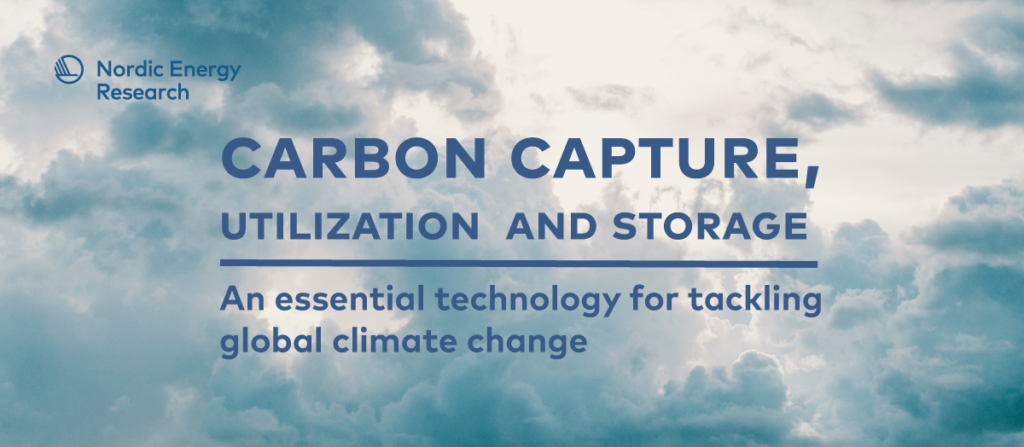
Call for proposals under Accelerating CCUS Technologies (ACT)
Carbon capture, utilization and storage (CCUS), involves the capture of carbon dioxide (CO2) from fuel combustion or industrial processes, the transport of this CO2 via ship or pipeline, and either…

Carbon capture, utilization and storage (CCUS), involves the capture of carbon dioxide (CO2) from fuel combustion or industrial processes, the transport of this CO2 via ship or pipeline, and either its use as a resource to create valuable products or services or its permanent storage deep underground in geological formations. CCS is an essential technology for achieving negative emissions, which is possible when the CO2 captured comes from bio-based processes or directly from the atmosphere. Together with Accelerating CCS Technologies (ACT) and 11 countries and regions from around the world, Nordic Energy Research is launching a call for CCUS proposals. Please find the full call text below.
Available budget
Nordic Energy Research has allocated 3 MNOK to fund Nordic project partners in the Call for Proposals ACT3. Nordic Energy Research anticipates funding two projects, depending on quality, size and applied funding of the project proposals.
Applying for the call
Within the framework of ACT3, a two-stage submission and evaluation procedure will be adopted. All pre-proposals (stage 1) and full proposals (stage 2) to this ACT call shall be submitted by the lead applicant to the ACT Secretariat (Research Council of Norway, RCN). Please consult the call text for more information about the application procedure.
In addition, partners applying for funding from Nordic Energy Research are required to submit a separate application at each stage.
- Stage 1: Submission of pre-proposal via email. Please download and fill out the project outline and budget template and send via email to info@nordicenergy.org
- Stage 2: Submission of full proposal. Please submit the full proposals to Nordic Energy Research via the NordForsk application portal (opens 15 December 2020, by invitation only)
Eligible project partners
Nordic Energy Research may offer support to Nordic project partners if there are a minimum of two Nordic partners from two different Nordic countries involved in a project.
Nordic Energy Research supports research within public and private entities such as
– Universities and research institutes (100% funding intensity)
– Companies (50% funding intensity, subject to state aid rules)
– Municipalities (100% funding intensity, special rules may apply)
Please note that EUDP/Denmark and RCN/Norway are participating in the call as funding institutions on a national basis. It is thereby possible for project partners to fulfil the criteria of two Nordic project partners either with one partner applying for funds from Nordic Energy Research and one partner from EUDP or RCN, or with two project partners from two different Nordic countries applying to Nordic Energy Research. Information about participation via EUDP and RCN is available in the call text.
Each project proposal for ACT 3 must be submitted by a project consortium consisting of at least three eligible applicants involving at least three funding organisations participating in the ACT 3 call.
Thus, all applicants applying for funds from Nordic Energy Research will count as one involved funding organisation in the total project proposal.
Eligible costs
Eligible costs that may be covered for a project partner may be personnel costs, travel costs, consultancy, material costs, laboratory costs, equipment costs, patent and/or indirect costs (only academia).
Research topics of Nordic interest
Participation in this call is part of Nordic Energy Research’s focus area on CCUS.
Partners funded by NER should include one of the following research topics in their research:
- CCUS business models. To deploy CCUS-technology in the Nordic region, business models that could incentivise cost-effectiveness and operation of such technology need to be identified. Research could focus on current hindrances and/or business models used in other sectors and countries that have potential to address these challenges and drive cost reductions.
- Public acceptability. This subject is recognised as an important issue in shaping the widespread implementation of the CCUS-technology. As an example, the process of constructing, extending and upgrading CCUS plants and infrastructure may face significant challenges in terms of public acceptance because of opposition on grounds of perceived risks to health, nature or intrusiveness of infrastructure in the landscape. Research on how to change/increase public acceptance on CCUS could help in creating a dialogue between different stakeholders and result in a more inclusive green transition.
- Environmental, climate and policy issues. CCUS technology is highlighted as an important tool to keep greenhouse gases out of the atmosphere. Research focusing on the implications of achieving negative CO2 emissions and the role of CCUS in reaching international climate goals could provide more insight into the potential impact of this technology. CCUS technology also poses potential environmental risks. Research with an environmental focus could increase the understanding of risks and risk management.
- Laws and regulations. There are many overlapping laws and regulations that impact and hinder large-scale deployment of CCUS in the Nordic region, both on a national and international level. Research on this topic could examine the legal regimes and propose changes to them, which would facilitate further development of CCUS in the Nordics.
Nordic added value
Nordic Energy Research aims to facilitate cooperative energy research and policy development, and funds research of joint Nordic interest that supports the ambitions to reduce carbon emissions in the Nordic region. Nordic applicants should elaborate on how the project would contribute to Nordic added value by enhancing Nordic strengths and addressing Nordic challenges, and how the results of the project would have impact on the Nordic region. Means to achieve such effects could for example be building critical mass, cost-efficiency, sharing resources, Nordic mobility and networking, institutional collaboration and competence building in the Nordic region, etc. Applicants are required to address these aspects in their separate proposal to Nordic Energy Research.
Gender balance and gender perspectives
Gender awareness improves the quality of Nordic research and research collaboration. Both gender balance among researchers and gender perspectives on research topics increase the quality of research and of policy decisions with implications for the society. Gender balance aims at a balance between men and women. Gender perspectives on research topics aim at exposing gender-based differences because they often impact the research results significantly. As such, Nordic Energy Research will aim to support research proposals where a gender balance of minimum of 40%/60% is implemented, both among project participants and managers/team leaders, and that address gender perspectives as part of the proposed research activities. For more information, please find Nordic Energy Research’s gender policy here.
State aid rules/De Minimis Aid obligations
Companies applying for funds from Nordic Energy Research are required to abide by state aid rules. All grants from Nordic Energy Research must comply with the aid rules of the European Union and the Agreement on the European Economic Area (The EEA Agreement). However, organizations under The Nordic Council of Ministers were given new guidelines for State Aid as of 2019, and these applies a.o. for Nordic Energy Research.
The support offered is being granted in compliance with Commission Regulation (EC) No 1407/2013 on the application of Articles 107 and 108 of the Treaty on the Functioning of the European Union to de minimis aid, published in the Official Journal of the European Union L 352 from 24.12.2013.
Grants from Nordic Energy Research for the ACT 3 call comes from the five Nordic governments and a Nordic undertaking is allowed to receive up to € 200,000 of de minimis aid from each of the Nordic Countries. Consequently, a Nordic company can receive up to 1,000,000 EUR over a rolling period of three fiscal years from Nordic Energy Research under the de minimis regulation, given that the company has received no grants as De Minimis Aid prior to this grant.
Timing and deadlines of the call
Pre-proposal submission deadline: 10 November 2020 (13:00 CET)
Successful applicants are invited to submit a full proposal.
Deadline for submitting full proposal: 15 March 2021 (13:00 CET)
Expected project start: September 2021
Disclaimer
If Nordic Energy Research, in its discretion, finds any application to be incomplete or outside the scope of the NER programme as described in call requirements, then such submission shall be deemed disqualified.
Contact Adviser Nicki Carnbrand Håkansson nicki.hakansson@nordicenergy.org
